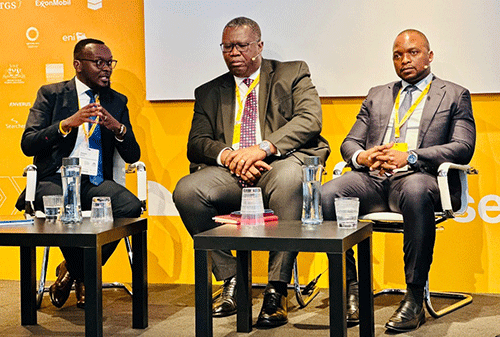The excitement surrounding the immense prospects of hydrogen energy is making Namibia a centre of attraction in Africa. The country’s potential to become a major continental producer has sparked debate at the recent Dubai Expo, the World Economic Forum, and the recent EU-Africa Summit.
“We at Nedbank are no strangers to supporting the development of renewable energy,” said Tjivingurura Mbuende, Executive: Corporate and Investment Banking. Long before renewable energy financing became popular, the Nedbank Group recognised its potential, resulting in the financing of several projects across Africa. “The recent drive by the Namibian government to develop the US$9.4 billion green hydrogen project in Namibia fits into the Nedbank Group’s long-term plans for funding renewable energy. Nedbank Namibia views this development as an important step toward Namibia becoming a major producer of renewable energy, given the country’s high potential for wind, solar, and hydrogen energy,” he noted.
The Nedbank Group has identified renewable energy as having the potential to deliver positive long-term sustainable outcomes for South Africa, Namibia, and the rest of the African continent. With the world moving toward developing renewable or green energy, Namibia’s proposed hydrogen project is an indication that the country is moving in the right direction.
Lately, Namibia has attracted considerable investment interest following the announcement by the government that it intends to produce hydrogen energy for both local and national markets.
Nedbank Group’s energy finance division recognises the importance of sustainable power across the African continent and the role of independent power producers in the private sector.
“To date, Nedbank has committed to funding 42 projects in South Africa through the Renewable Energy Independent Power Producer Procurement Programme. In 2019, Nedbank became the first bank in South Africa to list a renewable energy bond in the green segment of the Johannesburg Stock Exchange (JSE). Nedbank uses investment proceeds from the new bond to deliver financial support to solar and wind renewable energy projects. We’re committed to financing and supporting the entire value chain, from power infrastructure developers to contractors and original equipment manufacturers,” Mbuende explained.
Government has announced plans to develop a green hydrogen project in the Tsau-Khaeb National Park. The project is expected to produce 300 000 tons of green hydrogen per year, either as pure green hydrogen or as green ammonia, destined for regional and global markets. Nedbank Namibia believes that renewable energy offers enormous potential for job creation and economic growth in Namibia. Once fully operational, the hydrogen project is estimated to provide 3 000 permanent jobs.
“It is our understanding that the project will pay concession fees, royalties which will contribute to the soon to be established Welwitchia Fund (Namibia’s Sovereign Wealth Fund) and an environmental levy to the government, which is evidence that the development of more renewable energy projects can help change the country’s economic fortunes. Undoubtedly, green energy will make Namibia self-sufficient in its electricity needs. Due to low domestic generation, Namibia now imports approximately 60% of its overall electricity requirements, leaving room for increased renewable production,” noted Mbuende.
According to Nedbank, the development of the hydrogen project will necessitate investments in transmission infrastructure, port facilities, wind, and solar resources.
These are the kinds of projects that the Nedbank Group has shown interest in funding across Africa.
The launch of Namibia’s first green hydrogen production plant is indicative that efforts to develop hydrogen energy are taking shape.
The plant, a demonstration hub for hydrogen applications, is slated to be built in the Erongo region. The construction is scheduled to commence this year, with the plant projected to be operational by the end of the third quarter of 2023.
A large-scale production plant is intended to be constructed depending on the outcome of the performance of the demonstration plant, possibly employing ammonia as transport fuel.
Namibia has the capacity for an annual production of green ammonia of more than 2.5 million metric tonnes. Namibia, Egypt, Morocco, and South Africa are some of the African countries already pursuing hydrogen energy development.
Mbuende concluded by saying that “Nedbank believes renewable energy will help increase Namibia’s electricity production at a faster rate over the next decade, and that clean energy is expected to make Namibia a more attractive destination for energy investment compared to its neighbours who depend on coal plants and hydropower”.



